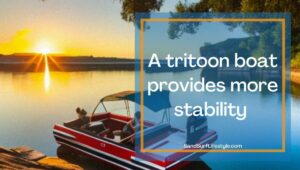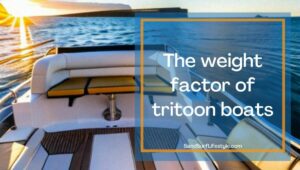Pontoon and tritoon boats are popular choices for recreational boating due to their spacious decks, comfortable seating, and versatile designs. However, when it comes to handling rough water conditions, not all boats are created equal.
A tritoon boat provides more stability

Stability is a critical factor when navigating through rough water conditions, and tritoon boats have a distinct advantage over traditional pontoon boats in this regard. The additional hull on a tritoon boat provides increased buoyancy and stability, which helps reduce the effects of waves and chop. This means that the boat is less likely to tip or rock, providing a smoother ride and greater peace of mind for those on board. The increased stability of tritoon boats also makes them safer for water activities, especially for families with young children or elderly passengers, who may be more prone to falls or accidents.
Furthermore, tritoon boats’ enhanced stability also means they can handle higher speeds in bumpy water conditions. The increased surface area of contact with the water allows for better weight distribution and less drag, which translates to a more efficient ride. The reduced drag also means that the boat can move through waves with greater ease, allowing for a smoother and more comfortable ride even in choppy waters. Overall, tritoon boats are more reliable to use when cruising uneven waters, which makes them a popular choice.
The better maneuverability of three-tubed boats
Tritoon boats are known for their better mobility, especially in rough water, due to the more powerful thrust of their larger engines. The following are some benefits of a tritoons’ superior maneuverability in rough water, which gives them a clear advantage:
- Easier navigation through waves and choppy waters makes for a smoother ride.
- Improved responsiveness and control, allowing for quick turns and better handling in tight spaces.
- Increased safety and confidence, as the boat can better avoid obstacles and potential hazards in rough water.
Pontoon boats, on the other hand, may not be as steerable in choppy water conditions due to their smaller engines and limited thrust. As a result, they may struggle to navigate through waves and avoid obstacles, leading to a less enjoyable and potentially hazardous boating experience.
For those who want to enjoy boating without compromising on safety, comfort, or performance, the use of tritoon boats in rough waters is a more popular option.
Five Steps to Remove an In-Mast Furling Mainsail
An extra and bigger toon can help increase a boat’s speed
Tritoons are known for their impressive speed in rough water conditions. On average, pontoon boats tend to have a horsepower of around 165 HP. In contrast, tritoon boats can typically accommodate higher horsepower engines, with some models capable of reaching 250 and some even exceeding 350 HP. One of the reasons for this is their larger engines which provide greater power and propulsion compared to pontoon boats. Additionally, tritoon boats typically have a more efficient hull design with a lower profile and less drag, allowing them to maintain speed and maneuverability even in choppy waters.
In contrast, pontoon boats may struggle to maintain speed and stability in rough water conditions, particularly with smaller engines or overloaded weight. Their larger size and higher center of gravity can make them more susceptible to swells and waves, leading to a bumpy, uncomfortable ride. Therefore, if speed is a priority for you, a tritoon boat may be the better choice, particularly for activities such as water skiing, tubing, or wakeboarding.
The weight factor of tritoon boats

Tritoons are generally heavier than pontoon boats, which can provide them with added stability and reduce the risk of tipping over. The additional weight of a tritoon can also help absorb the impact of waves, reducing the amount of jostling that passengers experience while onboard. This feature can make tritoons a preferred choice for those planning to spend time in open water or navigate through rough conditions.
However, the added weight of a tritoon can also make it more challenging to maneuver in tight spaces or shallow waters. The increased weight can make it more difficult to slow down or stop, and the boat’s draft may be too deep to navigate through shallow waterways. The added weight of a tritoon can also make it more difficult to use a trailer, requiring a larger vehicle and more specialized equipment. As such, while tritoons may offer superior stability in rough water conditions, they may not be the best choice for all boating situations. It’s essential to consider the specific waterways you plan to navigate and the type of boating activity you intend to do to determine if a tritoon or pontoon boat is the right choice for you.
What’s the better flatboat for rough-water activities
When deciding between pontoon and tritoon boats for rough-water activities, it’s important to consider key factors such as stability, maneuverability, and intended use. While tritoon boats tend to be better suited for choppy waters due to their increased stability, they can be more challenging to maneuver in tight spaces and may require a more powerful engine, resulting in higher fuel costs.
On the other hand, pontoon boats offer a more relaxed boating experience and are easier to maneuver in tight spaces, making them a good option for those looking to entertain guests aboard or navigate through marinas.
When choosing between pontoon and tritoon boats for rough-water activities, make sure you answer these questions:
- What is the primary use for the boat? Will it be used for watersports, fishing, or leisurely cruising?
- What are the typical water conditions in the area where the boat will be used? Are the waters often rough, or are they typically calm?
- How important are stability and maneuverability in rough water conditions?
- What is the budget for the boat, and what are the ongoing maintenance costs?
- Will the boat be used primarily in open water or narrow waterways?
Conclusion

While both pontoon and tritoon boats offer spacious decks, comfortable seating, and versatile designs, tritoon boats are better suited for rough water conditions due to their enhanced stability, better maneuverability, and impressive speed on the water. Ultimately, the choice between a pontoon and a tritoon boat for rough water activities depends on your specific needs and intended use.
The Disadvantages of Furling Mainsails
This blog post is provided for informational purposes only. The information contained is not intended to constitute legal advice or to substitute for obtaining legal advice from a qualified attorney.

